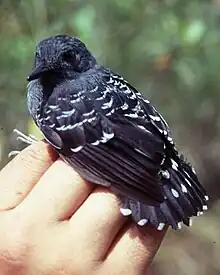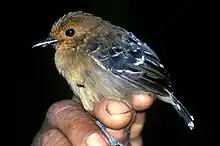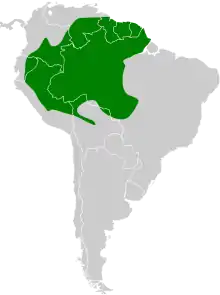Common scale-backed antbird
The common scale-backed antbird (Willisornis poecilinotus) is a species of passerine bird in the antbird family, Thamnophilidae. It is found in the Amazon of Bolivia, Brazil, Colombia, Ecuador, French Guiana, Guyana, Peru, Suriname, and Venezuela. Its natural habitat is tropical moist lowland forests. As with other species of antbirds, it regularly follows swarms of army ants as they flush insects and other arthropods out of the leaf litter.
| Common scale-backed antbird | |
|---|---|
 | |
| Male, Cordillera del Cóndor, Ecuador | |
 | |
| Female, Cordillera del Cóndor, Ecuador | |
| Scientific classification | |
| Domain: | Eukaryota |
| Kingdom: | Animalia |
| Phylum: | Chordata |
| Clade: | Dinosauria |
| Class: | Aves |
| Order: | Passeriformes |
| Family: | Thamnophilidae |
| Genus: | Willisornis |
| Species: | W. poecilinotus |
| Binomial name | |
| Willisornis poecilinotus (Cabanis, 1847) | |
 | |
| Synonyms | |
| |
The common scale-backed antbird was described and illustrated by the German ornithologist Jean Cabanis in 1847 and given the binomial name Hypocnemis poecilinotus.[2] The specific epithet is from the Ancient Greek poikilonōtos "with variegated back" (from poikilos "spotted" and nōton "back").[3] It was subsequently included in the genus Hylophylax, but was found to not be closely related to the other species in the genus and was placed in Willisornis. It was briefly placed in Dichropogon, but this name is preoccupied by a genus of asilid flies (Dichropogon Bezzi, 1910).[4][5][6] It was formerly considered conspecific with the Xingu scale-backed antbird.[7]
There are five subspecies:[8]
- Willisornis poecilinotus poecilinotus (Cabanis, 1847) – south Venezuela, the Guianas and northeast Brazil
- Willisornis poecilinotus duidae (Chapman, 1923) – east Colombia, south Venezuela and northwest Brazil
- Willisornis poecilinotus lepidonota (Sclater, PL & Salvin, 1880) – southeast Colombia, east Ecuador and northeast Peru
- Willisornis poecilinotus griseiventris (Pelzeln, 1868) – southeast Peru, north Bolivia and southwest Amazonian Brazil
- Willisornis poecilinotus gutturalis (Todd, 1927) – northeast Peru and west Amazonian Brazil
In addition to being sexually dimorphic, the plumages of the subspecies are highly variable, leading to speculations that the common scale-backed antbird as presently defined may include more than a single species. Males of all subspecies, and females of some (but not all) subspecies have white bars on the back, leading to its English name common scale-backed antbird.
References
- BirdLife International (2016). "Willisornis poecilinotus". IUCN Red List of Threatened Species. 2016: e.T103658813A94882120. doi:10.2305/IUCN.UK.2016-3.RLTS.T103658813A94882120.en. Retrieved 17 November 2021.
- Cabanis, Jean (1847). "Ornithologische notizen". Archiv für Naturgeschichte (in German). 13: 186–256 [213] Plate 4, figs. 2, 3.
- Jobling, James A. (2010). The Helm Dictionary of Scientific Bird Names. London: Christopher Helm. p. 311. ISBN 978-1-4081-2501-4.
- Agne, C.E.Q.; Pacheco, J.F. (2007). "A homonymy in Thamnophilidae: a new name for Dichropogon Chubb". Revista Brasileira de Ornitologia. 15 (3): 484–485. Archived from the original on 2018-02-06. Retrieved 2018-02-20.
- Brumfield, R.T. (June 2007). "Proposal (286): Revive the genus Dichropogon". South American Classification Committee of the American Ornithological Society. Retrieved 6 February 2018.
- Agne, Carlos Eduardo; Pacheco, Jose Fernando (March 2008). "Proposal (340): Reassign Dichropogon to Willisornis". South American Classification Committee of the American Ornithological Society. Retrieved 6 February 2018.
- Isler, M.L.; Whitney, B.M. (2011). "Species limits in antbirds (Thamnophilidae): the Scale-Backed Antbird (Willisornis poecilinotus) complex". Wilson Journal of Ornithology. 123 (1): 1–14. doi:10.1676/10-082.1.
- Gill, Frank; Donsker, David, eds. (2018). "Antbirds". World Bird List Version 8.1. International Ornithologists' Union. Retrieved 4 February 2018.
Further reading
- Cadena, C.D.; Londoño, G.A.; Parra, J.L. (2000). "Nesting records of five antbird species from the Colombian Amazon". Wilson Bulletin. 112 (3): 313–317. doi:10.1676/0043-5643(2000)112[0313:NROFAS]2.0.CO;2.
- Willis, Edwin O. (1982). "The behavior of scale-backed antbirds" (PDF). Wilson Bulletin. 94 (4): 447–462.
External links
- Scale-backed antbird photo gallery VIREO
- Photo; Article chandra.as.utexas.edu
